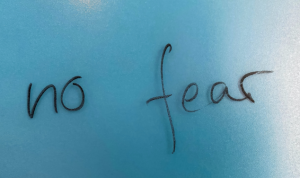My last blog post contained some reflections on the struggles with fear—especially bullying—that I’ve dealt with on a personal level in the past. In this post, I want to focus on escalating fears I am observing all around me—and feeling myself—that seem to be operating on a societal level today. We are currently living in a climate of fear unlike anything I have experienced in my lifetime. Even though I have lived through multiple wars, serious civil unrest, the threat of nuclear annihilation and terrorism, the level of fear I feel now on a daily basis seems, like so much else these days, “unprecedented.”
While some of our current fear may be justified, I believe that no small part of it is deliberately manufactured. It seems that everywhere I turn, I am confronted by what I see as efforts to use fear to gain power, control, or sell us products—or candidates.
How many times a day do you get panicked, fear-mongering texts or emails seeking contributions and predicting catastrophic consequences if their fundraising goal is not met? What does that do to your fear level? Facing the destructive, manipulative use of fear, particularly at the highest levels of power, can create even more fear within us. It certainly does in me!
I don’t believe that God wants us to live in fear. My challenge recently has been to find a healthier response to fear that incorporates my faith and helps move me forward in my spiritual journey. In working with my own fears, I’ve developed a four-step action plan that I would like to share with you:

1: Identify and name the fear
This is not as easy as it sounds. We are so bombarded by fear-inducing messages and triggers that we often tune them out as part of our emotional survival plan. We may not even know we are afraid, much less of what.
First, become aware of your emotional state. Are you feeling short tempered or “out of sorts”? Can you feel physical clues in your body (i.e. chest constriction, rapid breathing, increased heart rate, trembling)? Are you restless and unable to concentrate? Are you having difficulty sleeping?
If you notice any signs of fear or anxiety, try to trace them back to the cause. When did you first start feeling this way? What might have triggered it? Was it the alarmist headline you read this morning? Or the cough you just noticed that might be the beginning of a serious illness? Or the argument you had with a loved one which sparked your fear about the relationship?
Name the fear as precisely as you can. Simply naming the fear can give you power over it.
Try to identify and name the fears you are presently carrying around. Here are some I am experiencing or hearing from folks around me:
Fear of myself or a loved one getting the virus
Fear that lack of good medical coverage will result in bankruptcy or inadequate health care
Fear of losing my job and not being able to support myself/family
Fear of suffering a crisis that overwhelms my limited emergency savings
Fear my family business will not recover if this goes on much longer
Fear of how the other party will act out if they lose the election
Fear what will happen if the other party wins the election
Fear that I will lose friends or loved ones over politics
Fear of retaliation if I put out a sign on my lawn supporting my candidate of choice
Fear that climate change will have devastating effects if steps are not taken
Fear that steps taken to address climate change will wreck the economy
Fear social security is going to be bankrupt and it’s the primary component of my retirement
Fear the worst of this virus is yet to come
Fear my depression is going to take over my life again
Fear I won’t be able to hold it together any longer
I just recently identified a fear of mine regarding this post. I’ve gotten some feedback on past posts that I shouldn’t “mix religion and politics” which raised the fear that this post might offend some readers and lose some subscribers. How ironic is that? Experiencing fear around writing a post about fear!
2: Evaluate the validity of your fear

Photo by Etienne Girardet on Unsplash.com
Once you have identified the fear, determine if it is justified. Sometimes, the “self messages” we tell ourselves like “If my current partner breaks up with me, I’ll be alone forever” or “If my candidate loses, the world as we know it is over” are overblown. We also tend to be more afraid of dramatic threats like terrorists or sharks that are extremely rare than more mundane ones like car accidents or firearm accidents that are exponentially more likely to cause fatalities.
Other times, however, the fear is quite legitimate. Not all fears are unwarranted. Some are critical and essential to our well-being, and may even be life-saving at times. And on occasion, not only are the fears justified, but they may even be underrated. You might find that getting more facts makes you more concerned, not less!
However, I believe there are many instances where we are more afraid than we need to be and the fear is being stirred up to manipulate our behavior. Fear of the other candidate is used to elicit campaign contributions and votes. Fear of bad breath is stoked to sell mouthwash; fear of germs sells cleaning supplies; fear of wrinkles sells moisturizer. Fear of God’s wrath is promoted to “sell” religion. Fear is generated to get us to buy home security systems, car warranties, and life insurance. Fear of crime or gun-control legislation is propagated to sell guns. And these fear tactics work! A recent report indicated that almost 3,000,000 more firearms have been sold since March than would have ordinarily been sold during these months.
How can you combat these manipulative attempts to stoke your fear? First off, when you see a fear-inducing message, ask yourself if the messenger stands to benefit from it. If they will profit by it, look for independent sources to confirm the claims.
For example, I see a statement by politicians clearly attempting to create fear. To see if it is legitimate, I go to at least two established fact-checking sites. Often I find the information is not accurate. I can also judge it against my personal experience. Is that an actual fear I had before hearing this politician? Does my life experience support that fear? These are what I call reality checks and we need to get better at running them in a world that is constantly trying to sell us false information.
3: Create and execute an action plan

Photo by Annie Spratt on Unsplash.com
If you determine that the fear is legitimate, brainstorm practical things you can do to reduce the likelihood of your fear coming to pass or minimize its impact on you if it does. For instance, by educating myself through frequent conversations with experienced mushroom pickers, a handbook, and the Internet, I’ve reined in my lifelong fear of poisoned mushrooms enough to start a brand-new “pandemic hobby” of wild mushroom foraging!
For many of the fears we have that are national or even global in nature, though, our individual actions will never be able to address the issue. Don’t let that discourage you from taking action! An action plan does not need to solve the problem to be effective. Any concrete steps, no matter how small, will help diminish our fear since part of the fear is the feeling of helplessness that comes with it.
Included in this step is acknowledging the responses to fear I have used in the past that haven’t served me well and may have actually made things worse! For example, avoidance or challenging the salesman who was trying to sell me a car warranty when he was only trying to do his job and make a living. It is easy to fall into old habits that aren’t constructive.
Finally, consider sharing your action plan with others. This step has been a game changer for me. Sharing my evolving action plan with someone I trust, in my case my wife Rita, builds in a support system and accountability!
4: Give the fear to God
When you have a legitimate fear that is beyond your ability to prevent or prepare for, what then? I spoke with about a dozen folks I respect recently about how they are dealing with their fears in relation to their faith. Their responses varied significantly but several said some version of, “I simply turn them all over to God!”
I do much the same. Since my understanding of God does not include direct intervention so much as steadfast support and everlasting relationship, I don’t expect divine protection from the things that scare me. Instead, I trust that God will walk with me through the difficult times. What I hear from God most often is something like, “I will hold your fears a bit then allow you to decide how you will deal with them and I hope you will find a way to make them produce good and healing for both you and all involved.”
I’m still a work-in-progress, but God seems to understand and appreciate my intention and I am learning to experience God’s presence more and more as I face and struggle with my fears. The way things are shaping up, it looks like there’ll be plenty of opportunities for more practice ahead!
QUESTONS FOR DEEPENING THE JOURNEY
- What fears are you carrying around right now?
- Do you find yourself vulnerable to some types of fear messages more than others? What is most likely to trigger a fear response in you? Why do you think this is?
- Do you find yourself more fearful after watching certain shows, reading certain news outlets, listening to certain radio hosts, talking to certain people, or spending time on social media? What effect would it have on your life to limit your time engaging in activities that raise your fear level?
- What is your typical reaction to fear? Do you deny it? Ruminate? Face it head on? Are you satisfied with your response?
- What action steps can you take to address your current fears? Can you commit to implementing your action plans? Why or why not?
- Have you tried to turn your fears over to God in the past? What does this mean to you? Were your efforts successful in diminishing your fear? Why or why not?
- How does your understanding of God affect what you expect from God in dealing with fear?
Banner Photo by Alexandra Gorn on Unsplash.com



This topic was very thought provoking and likely affects everyone of us as a part of life. The contributors and environment for personal fears could very well be at a peak right now. Thank you for an inspiring message.
Terry Once again, you have done an incredible job of identifying and confronting an issue that touches all of us in a variety of ways. I have always considered myself to be a positive person. Some might say that I even may have a Pollyanna approach to life. But, even during stressful times like the “Cuban missile crisis”, serving in the Army during Vietnam, or facing the threat of cancer or the Covid 19 virus, I have never experienced such fear as I have from the least likely source – the President of the United States! Regardless of the political… Read more »
I had a friend tell me once we really can only go one of two directions when faced with obstacles forward or backward. Thank you for the article it is very helpful and important to know we aren’t alone in feeling this way.